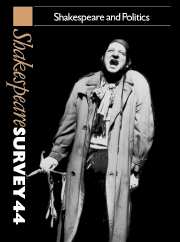Book contents
- Frontmatter
- Shakespeare and Politics
- Language, Politics, and Poverty in Shakespearian Drama
- Some Versions of Coup d’état, Rebellion and Revolution
- Woman, Language, and History in The Rape of Lucrece
- Love in Venice
- Two Kingdoms for Half-a-Crown
- ‘Fashion it thus’: Julius Caesar and the Politics of Theatrical Representation
- ’Demystifying the Mystery of State’: King Lear and the World Upside Down
- Tragedy, King Lear, and the Politics of the Heart
- The Politics of Shakespeare Production
- Shakespeare in the Trenches
- Shakespeare’s Earliest Editor, Ralph Crane
- Shakespeare’s Falconry
- Telling the Story of Shakespeare’s Playhouse World
- Shakespeare Performances in England, 1989–90
- Professional Shakespeare Productions in the British Isles January-December 1989
- Critical Studies
- Shakespeare’s Life, Times, and Stage
- Editions and Textual Studies
- Books Received
- Index
Some Versions of Coup d’état, Rebellion and Revolution
Published online by Cambridge University Press: 28 March 2007
- Frontmatter
- Shakespeare and Politics
- Language, Politics, and Poverty in Shakespearian Drama
- Some Versions of Coup d’état, Rebellion and Revolution
- Woman, Language, and History in The Rape of Lucrece
- Love in Venice
- Two Kingdoms for Half-a-Crown
- ‘Fashion it thus’: Julius Caesar and the Politics of Theatrical Representation
- ’Demystifying the Mystery of State’: King Lear and the World Upside Down
- Tragedy, King Lear, and the Politics of the Heart
- The Politics of Shakespeare Production
- Shakespeare in the Trenches
- Shakespeare’s Earliest Editor, Ralph Crane
- Shakespeare’s Falconry
- Telling the Story of Shakespeare’s Playhouse World
- Shakespeare Performances in England, 1989–90
- Professional Shakespeare Productions in the British Isles January-December 1989
- Critical Studies
- Shakespeare’s Life, Times, and Stage
- Editions and Textual Studies
- Books Received
- Index
Summary
This study will be a commentary on some Shakespearian dramatizations of coup d’état, rebellion, and revolution. These three concepts, which imply an obvious gradation within the theme of political violence, can be defined as follows. A coup d’état refers to a rather sudden attempt made by a few men to grasp the power of state at the top level; often, though not always, the attempt is supported by armed forces. A rebellion is a more general armed rising in defiance of the established authority. A revolution is a movement aiming at a lasting change in the social order. These definitions are simple and clear–cut so as to be acceptable by all readers. It may be doubtful whether they would be fully understood by a Renaissance mind, but too minute developments would lead to what Montaigne called ‘cette infinie contexture de débats’, which, it is felt, should be avoided here.
In Act 2, Scene 7 of Antony and Cleopatra a coup d'etat does not take place, but many of the ingredients contributing to the making of one are gathered. The failure of the coup, a contrario, points out the missing constituents. The scene takes place on board Pompey's galley, off Misenum. As host, Pompey is the master of his guests' fates. He is supposed to treat and feast them, but, isolated as they are from the terra firma, what cannot Pompey and Menas, his ally, perform upon the unguarded Antony, Lepidus, and Caesar? While the merry feasters speak of crocodiles, pyramids, and quicksands (18—58), Menas unfolds to Pompey the project that might give him 'all the world':
These three world-sharers, these competitors,
Are in thy vessel. Let me cut the cable;
And when we are put off, fall to their throats.
All there is thine.
(69-72)- Type
- Chapter
- Information
- Shakespeare Survey , pp. 25 - 32Publisher: Cambridge University PressPrint publication year: 1991

